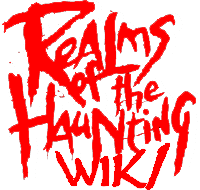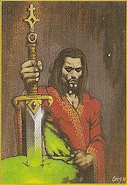|
Weapons
Colt-45 • Sword • Dragon Shield • Shotgun • Creator's Staff • Florentine's Staff • Flintlock
Aelf's Dagger • Belial's Wand • Chalice • Eternity • Power of Dominion • Perdition Shield |

| |
Attack Type
|
Ranged
Melee |
Attack Speed
|
Fast
|
Base Damage
(Ranged) |
300-599
|
Base Damage
(Melee) |
TBA
|
| Location | |

| |
Eternity (also called Sword of the Dragon) is a powerful, magically charged sword which originally belonged to Aelf. It is connected with the Shrive, and both together serve as the key to the Soulstone.[1]
Only those who have been marked, whose hands have been branded with the symbol of the Shrive, may take the sword, otherwise they will be burned on touch.[2]
Eternity can initially be found (and even obtained) when first visiting Hawk's Prison, just before meeting Belial for the first time. Adam is at a figurative and literal crossroads, where he must use the Chalice to open two doors, revealing Aelf's Dagger behind one and Eternity behind the other. Although Adam has the freedom to choose either, if he picks up Eternity he will be shortly confronted and killed by Belial. The story forces us to take Aelf's Dagger instead, because Adam uses it to defend himself from Belial's attack. After the cutscene, Eternity is no longer available to pick up behind the door required by the Chalice.
Where Eternity can actually be obtained is much later in the game, when visiting Arqua and successfully completing Tishtrya's puzzle.
Eternity is taken during the Prisoner chapter and must be later picked up within the Tower.
As a weapon, Eternity can either be used in melee combat similar to the rusted Broad Sword we took from the weapon rack in the Study, or alternatively as a ranged weapon, shooting a powerful, magical missile at the opponent. The second attack is only available in its loaded state, as indicated by the sword's purple colour on the upper section of the HUD.
Centuries ago, Florentine took the sword from the Soulstone and thus performed the first step in unsettling the balance of the universe. As related in his Journal, after having removed the Sword, he cannot touch it anymore without being burned, hence he decides to stash in a secret spot in the Cottage.[3] A couple of days later, on January 29th 1330, the Sword has disappeared from its secret stash and Florentine has not managed to retrieve it again ever since.[4] In later entries of his Journal, he repeatedly writes about having recurring dreams about the Sword.
Script[]
| “ |
Adam: At last... Eternity. This is why I've been brought here. Everything has been leading to this. The sword of Florentine's dreams; the Sword of the Dragon. I can feel its power... its energy. It's part of me. But there's another. I can feel their energy, connecting with mine... and the swords. Who can it be? So close. |
” |
| “ |
Adam: Now all we've got to do is take the Dragon Sword to the Chamber of the Soulstone. |
” |
| “ |
Adam: So now we have Eternity - the Dragon Sword. This thing's as light as a feather you know. |
” |
Rebecca hereby freely quotes from Robert Jordan's Wheel of Time series of fantasy novels, where it appears as a proverb inherent to the Shienaran race of people.
This line apparently is not an invention by Jordan, though, but seems to originate from the codex of the Japanese samurai, as suggested by GOG forum user Lafazar.
Here's the excerpt from Robert Jordan's The Great Hunt, Book Two in the Wheel of Time series:
| “ |
It was another voice he heard then. Lan's voice. There will come a time when you want something more than you want life. Ingtar's voice. It is every man's right to choose when to Sheathe the Sword. The picture formed of Egwene, collared, living her life as a damane. Threads of my life in danger. Egwene. If Hawkwing gets into Falme, he can save her. Before he knew it, he had taken the first position of Heron Wading in the Rushes, balanced on one foot, sword raised high, open and defenseless. Death is lighter than a feather, duty heavier than a mountain. |
” |
Looking further into the origins of this saying, I've come across two illuminating explanations, stating that the quote has been misattributed to Jordan:
| “ |
Although some believe that Jordan is the author of this, it is in fact a Japanese proverb (義は険しい山よりも重く、死は大鳥の羽よりも軽い) best known for its use in the Imperial Rescript to Soldiers and Sailors. It is itself a variation of a Chinese proverb that can be traced back at the very least to Han dynasty writer Sima Qian, Death can be as heavy as Mount Tai, or lighter than a goose feather (死有重於泰山,輕於鴻毛). |
” |
| “ |
"Death is lighter than a feather, duty heavier than a mountain": According to John Pickett, the quote is an excerpt taken directly from the First Precept of the Imperial Rescript to Soldiers and Sailors, written in 1883 during the Meiji Period of Japanese history. David Vogt adds that it was also a popular proverb among Japanese suicide troops during the late stages of combat of the Second World War. |
” |
Depictions of Eternity[]
References[]
- ↑
“ Hawk: Metaphorically speaking, if the Soulstone is the lock, then Aelf's sword is the key. It is part of the Shrive.
” - ↑
“ Florentine: Have I made a terrible mistake? By taking the Sword from the Soulstone have I inadvertently set into motion a series of unstoppable events which I may be unable to halt. Is the Sword in some way connected to the Soulstone? Belial cannot touch the things at all for some reason. It burns me to the touch now, so much so that I have decided to place it in a place of safe-keep.
” - ↑
“ Florentine: Have I made a terrible mistake? By taking the Sword from the Soulstone have I inadvertently set into motion a series of unstoppable events which I may be unable to halt. Is the Sword in some way connected to the Soulstone? Belial cannot touch the things at all for some reason. It burns me to the touch now, so much so that I have decided to place it in a place of safe-keep.
” - ↑
“ Florentine: The Sword has disappeared from the safe-place in the cottage. I immediately suspected Belial but then realised my mistake. Last even, he was as restless as a new-born pal as we sat conversing in the study. He blamed his uneasiness upon the absence of the Sword. I am beginning to believe him now. The thief will be caught, caught and dealt with, mark my words.
”


